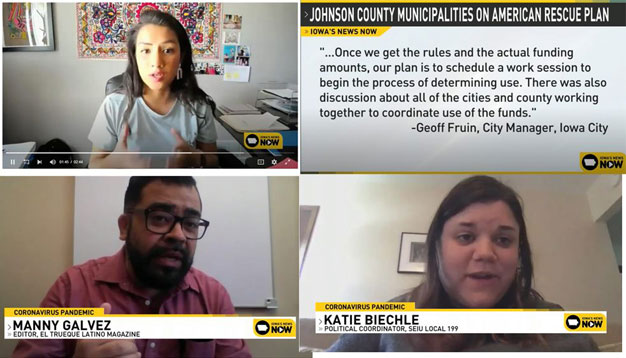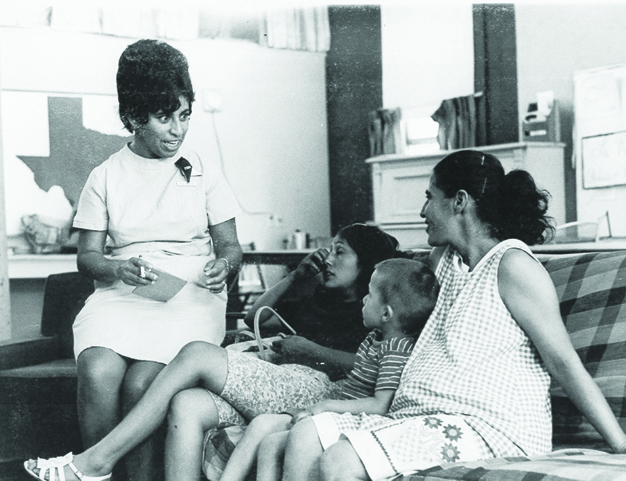
At an online meeting, representatives of various groups talk about needs of excluded workers.
By Barb Arland-Fye
The Catholic Messenger
Pope Pius XII established the feast of St. Joseph the Worker on May 1, 1955, hoping to inspire deeper devotion for the foster father of Jesus and acknowledging the value of the worker in Catholic Church teaching. Furthermore, the pope chose May 1 in response to the May Day celebrations for workers sponsored by Communists, according to Franciscan Media.
Excluded workers are at the heart of an advocacy movement underway in Iowa City and the greater Johnson County area. A coalition of groups including Iowa Citizens for Community Improvement, SEIU Local 199, AFSCME Local 12, Iowa City Catholic Worker, Iowa Freedom Riders and LULAC Council 38 are demanding pandemic relief funds for excluded workers and other marginalized people. The Iowa City Catholic Worker House organized the Fund Excluded Workers Coalition.
Catholic Social Teaching inspires the coalition’s guiding principles on expenditure of COVID-19 relief funds: “Public money should be spent on the common good, with a preferential option for the poor. Relief aid should go directly to the essential and excluded workers most impacted by the pandemic.”
Manny Galvez, a Latino with a job that allows him to support his wife and son, is also a Catholic Worker community member who feels committed to supporting the Latino community, especially those struggling to support their families during the pandemic.
“I can’t close my eyes to what other people need. We need to show fraternity, solidarity and even say thank you,” he said, referring to essential workers, some of them undocumented. Factory workers, farm workers, meatpacking plant workers, childcare providers, domestic workers, farm workers, construction workers, dishwashers and others.
“We cannot just move forward from the pandemic and forget some part of our community,” added Galvez, who as part of the Fund Excluded Workers Coalition seeks hazard pay for essential workers, cooperative housing for refugee resettlement and Sunday bus service.
On April 19, the coalition submitted a letter to county and local governments in the Iowa City/Johnson County region spelling out their demands for American Rescue Plan funds for excluded workers and other marginalized people.
“Almost $2.7 billion is coming to the state of Iowa, counties, cities and towns, including more than $29 million to Johnson County, $18 million to Iowa City, and millions more to other cities in Johnson County,” coalition members said in a news release. Coalition members specified four ways to allocate those funds, keeping in line with the guiding principles:
1. $20 million for an Excluded Workers Fund to provide more than 6,000 undocumented, excluded workers and previously incarcerated people with a portion of the economic stimulus, enhanced unemployment insurance, derecho disaster relief, and other reparations they never received. The coalition calls for grassroots groups with membership bases in the impacted communities to oversee aid distribution. The coalition also calls for elimination of burdensome paperwork requirements such as proof of financial impact, loss of income or back payments owed.
2. $20 million in hazard pay raises for the more than 12,000 public employees, school and hospital workers on the front lines of the pandemic. The coalition seeks an average of $1,600 more per worker per year, or nearly $150 in additional income per month.
3. $5 Million for 54 new community controlled, affordable housing and housing cooperative units for undocumented workers, previously incarcerated people, and refugee resettlement, collectively owned and managed by a housing cooperative and community land trust.
Coalition members say, “…caring for migrant children is our responsibility, and we should welcome them here in Iowa.”
4. $2 million for public transportation and Sunday bus service, expanding access to the city to everyone, seven days a week.
For the most part, the governing bodies have listened but not committed to a plan of action, Galvez said. KCRG.com quoted Rod Sullivan, a Johnson County supervisor who spoke at a county board meeting April 22. He appreciates the coalition’s good ideas and anticipates “a lot of opportunities to work with them and do a lot of things for the community.” However, “It’s just premature to commit to a single plan because there’s a lot of things we need to discuss.”
Galvez said the coalition plans to keep the conversation going with the governing bodies. “This is a human issue,” he said. The dignity of the worker, the flourishing of the worker requires the other necessities of life such as health insurance, life insurance and retirement benefits.
“The foundation of this country is the immigrant.”
In his apostolic letter “Patris corde” (“With a Father’s Heart”) introducing the Year of St. Joseph, Pope Francis reflected on St. Joseph’s role as a worker and the applicability in today’s world. “The crisis of our time, which is economic, social, cultural and spiritual, can serve as a summons for all of us to rediscover the value, the importance and necessity of work for bringing about a new ‘normal’ from which no one is excluded.”
Excluded workers share stories with Iowa City Council
Three immigrants who lost their jobs during the pandemic shared their stories with the Iowa City Council on April 20 and petitioned for funds through the American Rescue Plan to help them recover from their loss.
Emily Sinnwell, an Iowa City Catholic Worker and family and psychiatric nurse practitioner, translated for each of the immigrants, identified as workers, during the public comment period of the city council meeting held via video conferencing.
“Hello, my name is Rosa Brito Pastor and I’m from Guatemala and living in the Catholic Worker House….I was working in a Mexican restaurant during the pandemic. They lowered our hours, they let us go, they had me come back and work again. And then, about two months ago, they let me go because there wasn’t a lot of people and they didn’t need me anymore. So, I was left without work. I also have a 1-year-old son and I’m fighting for us. And I haven’t received any help. It’s not just me, there are many undocumented workers in my position and just because we’re immigrants, we should not be treated different.”
“Hi, my name is Ingris Diaz and I work in a hotel, cleaning. I am from Honduras and I’m a single mother of four children who were all born here. So my question is why haven’t we also received a stimulus check? Just because we’re immigrants doesn’t mean we should be treated any differently than other people here. We’ve all suffered the same under the same pandemic. We have to leave our houses and take the risk to go work and we should all be treated the same.”
“My name is Jacqueline (last name unintelligible). I’m a single mother of two children and since the pandemic started they let me go. To this day, I’m still not working. I was infected by COVID. For two weeks I was at home with my children, I wasn’t able to access healthcare and I was at home this whole time. We believe we should be given the same rights as other people even though we’re undocumented…”







